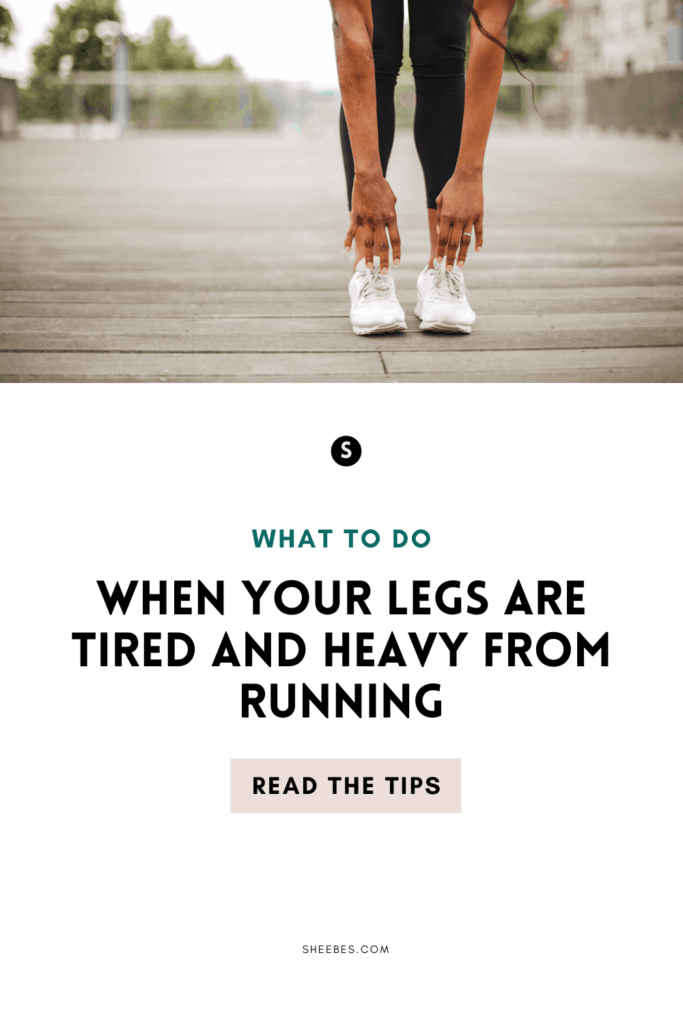Do you have this question, “Why do my legs feel heavy when I run?”
You may have had a great run yesterday, but your legs today feel like weights.
Are you wondering what’s going on and why your legs feel so heavy when running?
The brief answer to your question is heavy legs from running can come from a few things: too much running without recovery, a lack of carbs, sleep, or iron.
So if you’ve felt like you’ve been running through mud, you’re in the right spot.
Here we’ll dig into more detail on why your legs feel heavy when running and how you can turn it all around.
Let’s get started.

Whether you’re a runner looking for running tips or a cyclist searching for cycling advice, this site is here to help you elevate your fitness game.
Affiliate Disclosure: I’m here to help you grow as a rider and runner. So to keep things running smoothly and the content free, I participate in the Amazon Services program and select affiliate networks. So, when you click on those affiliate links, I earn a small commission at no extra cost to you.
WHY DO MY LEGS FEEL HEAVY WHEN I RUN?

You may be running too much without enough recovery if your legs feel heavy when running
You get stronger with running when you run *and* when you rest. You can’t run all the time and expect running strength gains.
That’s because running is stressful on the body. It’s a high-impact activity that stresses your body and creates microtears in your muscles, and because of this, you need to let your body heal itself before adding more stress—running.
How to recover tired legs from running when you’ve been running a lot: Aim for at least one rest day a week.
Without one, you’ll break down your body too much, and this increases your risk of injury, overtraining, and running burnout.
Plus, you’ll give yourself a mental breather from your running routine, and this can help you create a balance between running and life.
Though one rest day a week can reset and refresh your running, you may need more rest days than this.
We respond to physical stressors differently, so listen to your body and take the amount of rest you need.

Do your legs feel heavy when running? You may not be eating enough carbohydrates.
Before we dive into general running recovery food guidelines, you have individual energy requirements, food preferences, and performance goals.
If you need specialized sports-nutrition, please see a qualified sports dietitian*.
A sports dietitian can analyze your nutrition intake and give you a customized plan to support your activity level and performance goals.
*Credential to look for: The Board Certified Specialist in Sports Dietetics (CSSD) is a sports nutrition credential in the United States and internationally. It’s for nutritionists who focus on sports nutrition and who have vast experience in working with athletes.
Now let’s look at some guidelines on what to eat to help you recover from running. (Come on over to this post to find out what to eat before a run.)
Carbs 1. Carbs, the body’s main fuel source, gives you the energy to run. But you can’t run for miles without refueling. You’ll eventually need to refill your tank with more carbs to restore your energy.
Shortly after a run, aim for ~1.0–1.2 grams per kilograms per hour for 4 to 6 hours to rebuild your energy stores.
Got tired, heavy running legs? Here’s what to do
Do you have this question, “Why do my legs feel heavy when I run?” You may have had a great run yesterday, but your legs today feel like weights. Are you wondering what’s going on and why your legs feel so heavy when running? The brief answer to your question is heavy legs from running…
Protein 2. Consume high-quality protein sources of roughly ~0.25–0.3 grams per kilograms per body weight to give you amino acids to build and repair muscle tissue.
Don’t want to do the math to figure out the exact amount of carbs and protein you need to consume? This recovery mix will help you jumpstart your recovery if you’re looking for an on-the-go option.
Cherry juice. Did you know that cherry juice can speed recovery? The anthocyanins in Montmorency cherries have anti-inflammatory and antioxidative properties that can reduce inflammation and oxidative stress and help the muscles recover.
Side note, Montmorency cherry is a type of tart cherry grown in North America.
This study had marathoners drink 8 ounces of cherry juice twice a day for five days before their marathon and two days after their race. Runners who drank cherry juice had less inflammation 24 to 48 hours after a race
Not into cherry juice? You’ll find more options on recovery drinks for runners here.

You might have heavy legs when running if you didn’t have enough sleep
Getting a good night’s sleep is easier said than done, but it’s vital when you’re a runner.
If you run but skimp on sleep, then you’re only doing a small part of what’s needed to become a stronger runner.
Your hard work isn’t fully realized until you go to sleep.
Sleep is where the body releases growth hormones and androgens that repair muscle microtears and builds stronger bones.
Without sleep, your running may suffer3 4 and you might have low running motivation. 5
Experts recommend at least 7 hours of sleep for the most energy and motivation. But if sleep is hard to come by, how can you set yourself up for a good night’s sleep?
You could try a “wind-down” ritual, where you gradually wind down from the day and ease into bedtime mode.
Your wind-down ritual may include writing down your to-do list or planning your day tomorrow so you don’t lie awake worrying about the things left to do.
Or, try a sleep tracker to help you discover how much and how well you’ve been sleeping, your resting heart rate, and more. We’ve all heard it before—sleep is vital—and it’s even more so if you’re an active person. Not getting enough zzz’s will make you more irritable and stressed, you’ll find it hard to focus, and you’ll still have heavy legs when running.

Still feeling fatigued, with tired and heavy legs when running? Get your iron levels checked.
Iron helps your red blood cells ferry oxygen to your muscles, but if you are iron-deficient, running might end up feeling like a slow crawl.
You’re not alone in this—about 17% male and 50% of female endurance athletes suffer from an iron deficiency. 6
So if you’ve recovered well after your runs, had quality sleep, and eaten carbs, it may be time to get your iron levels checked, especially if you follow a vegan diet or have a menstrual cycle.
CONCLUSION
Heavy, tired legs from running can come from too much running without recovery, a lack of carbs, sleep, or iron.
But you don’t have to put up with heavy, tired legs when you’re running.
Take a break, eat your carbs, get some rest, check your iron levels, and most of all, listen to your body.

SOURCES
- Nutrition and Athletic Performance ↩
- Nutrition and Athletic Performance ↩
- Chase, John & Roberson, Paul & Saunders, Michael & Hargens, Trent & Womack, Christopher & Luden, Nicholas. (2017). One Night of Sleep Restriction Following Heavy Exercise Impairs 3-km Cycling Time Trial Performance in the Morning. Applied Physiology Nutrition and Metabolism. 42. 10.1139/apnm-2016-0698. ↩
- Cyclists who did an intense workout and then had a limited night’s sleep saw a 4% decrease in their 3-km time trial performance the next morning, suggesting that a lack of sleep may limit recovery between tough exercise sessions. ↩
- Marshall, Geoff J.G. MSc, CSCS; Turner, Anthony N. MSc, CSCS*D The Importance of Sleep for Athletic Performance, Strength and Conditioning Journal: February 2016 – Volume 38 – Issue 1 – p 61-67
doi: 10.1519/SSC.0000000000000189 ↩
- The impact of Morning versus Afternoon Exercise on Iron Absorption in Athletes ↩